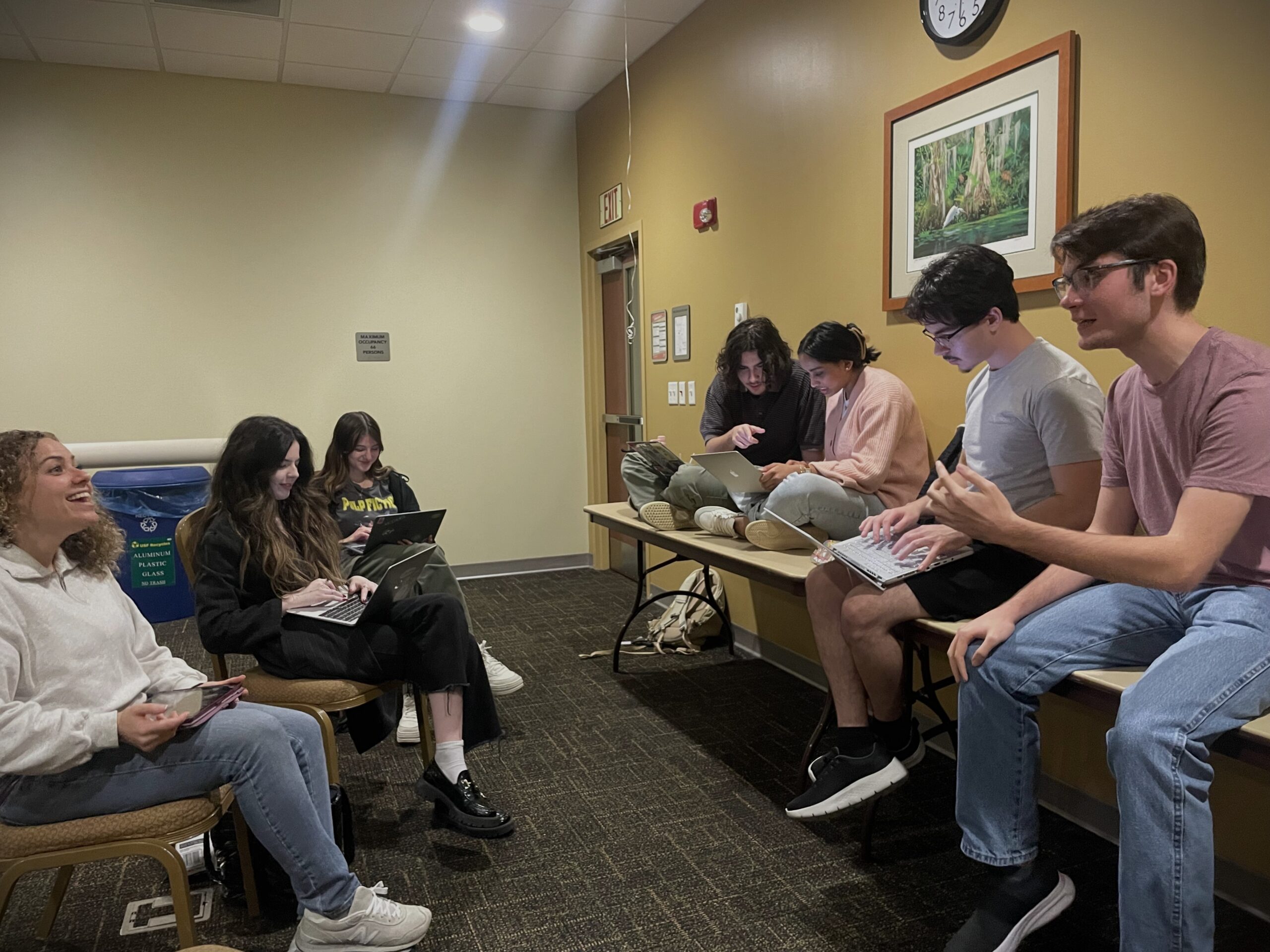OPINION: The verdict on USF pre-law: Guilty, but could do better

Lizzie wants to be a lawyer. She watched Elle Woods use the “cardinal rules of perm maintenance,” and she was sold.
To achieve her dreams, Lizzie attends USF because without a solid undergraduate degree and successful completion of the LSAT (Law School Admission Test), you cannot apply to law school.
But here’s the thing about Lizzie: She’s struggling at USF. Why? Because there’s a lack of resources and exposure around existing pre-law resources. You object?
Your honor, may I proceed?
The responsibility should not solely be on students to have to relentlessly hunt down support. USF must proactively ensure academic resources are promoted and available to all who need them.
A brief survey by The Oracle was distributed with 30 responses, representing a variety of majors. About 57% of participants said they were dissatisfied with USF’s pre-law resources and support.
An overwhelming 97% want more internships or law-related job shadowing opportunities.
Unfortunately, USF does not currently offer a dedicated pre-law major or minor – a huge bummer that would ease this burden and empower a pursuit in a legal career. Students are left to piece together relevant backgrounds and fundamentals by enrolling in a patchwork of political science classes and clubs.
“There are some classes that can be applicable, but no class is going to be like, ‘Okay, here’s a direct examination, here’s how you do it,’” Brian Crown, criminology major and president of USF’s Mock Trial club, said.
You need to see legal practices firsthand and get experience actually doing them yourself, not just sit down with a computer and organize lecture notes like a barrister in the Dark Ages. Actively participating in clubs like Mock Trial is vital for USF’s pre-law students to step out into the real world.
Speaking of the crème de la crème of clubs: Mock Trial meets twice a week, competes on weekends and practices every single day. Even calling them a “club” sounds belittling considering the amount of dedication everyone pours into the work they do.
This kinship is composed of diverse, intelligent students bonded by the shared experience of tournament after tournament.
Yet, the biggest negative for a student like Lizzie and others who already have a heavy workload is the time commitment. Mock Trial leaves little room for other activities, homework or even a social life. Board members expressed how you can’t just dabble; it’s all-consuming.
The team has already attended competitions against UCF and UF, traveling to Orlando and Gainesville. And if you were wondering, they won three out of four ballots at UCF and did not win any awards at the UF competition.
“We are solely student-led,” Duarte said.
If USF doesn’t start supporting this dedicated team more substantially, how will the next generation of leaders continue to make it thrive?
“There are other schools that have so many more resources in terms of coaches, mock trials being within their curriculum, actually teaching twelve procedures, and essentially preparing them for competitions even at the national level,” she continued.
While Mock Trial reigns supreme, USF has other pre-law clubs, like Phi Alpha Delta, Minorities in Pre-Law, Women in Pre-Law Society and Black Women in Law. Now, they’re options, but they’re a bit like supporting actors compared to Mock Trial’s leading role.
(Sorry Pre-Law Society. You don’t get coverage here because your meetings so far have been very Kahoot-heavy, so it just doesn’t count. Sending you love though, you’re new in town).
It’s important to note that these other clubs have benefits – they allow students to expand their networks and make beneficial personal connections. However, these groups typically don’t provide hands-on fundamental experiences to ready students for the rigors of law school itself.
USF could improve by expanding the funds for Mock Trial, as well as enhance support for aspiring lawyers by expanding LSAT prep options.
The corporate and professional education office offers a prep course, but for a $995 fee that limits accessibility for many students. Phi Alpha Delta does offer an on-campus 25% discount with Kaplan – helpful for members but still not enough.
Alina Thompson, a seven-year USF vet, newly minted pre-law adviser and senior academic adviser, provides top-notch support. She’s the secret weapon and USF’s pre-law guardian angel.
“Their resume is somewhat empty and really when it comes to applying to law school, it’s a very holistic review,” Thompson said in regards to law school applications.
“It’s not just GPA and LSAT scores. They want to see that you have some kind of experience.”
Thompson’s mentoring of aspiring law students is uniquely impactful, so promoting awareness of her guidance could inspire more to confidently pursue legal careers. She’s a game-changer. Spread the word.
I know, I know, no university can fully replicate the realities of law school within an undergraduate curriculum. And it’s not that we don’t have any pre-law resources – clearly Mock Trial and advisers like Alina Thompson provide valuable support. But USF can still do more.
While Thompson already guides students expertly, spreading awareness of her specialized advising could allow more aspiring lawyers to tap into her early on.
USF should broadcast these opportunities and showcase the indispensable organizations and advisors crucial to pre-law students’ success – and then we’re talking.
Armed with the right intel and pink outfit, Lizzie and other aspiring lawyers could do good, but not great, since USF seems to be fumbling the ball.
I think the Bull is guilty, don’t you?








